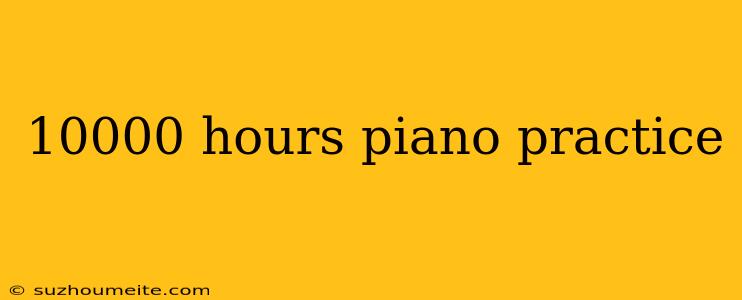The 10,000 Hour Rule: Does it Apply to Piano Practice?
The concept of the 10,000 hour rule, popularized by Malcolm Gladwell in his book "Outliers," suggests that to become an expert in any field, one must dedicate at least 10,000 hours of intense, focused practice. But does this rule apply to piano practice? Can anyone become a master pianist with enough hours of practice?
What Does the Research Say?
Several studies have investigated the relationship between practice time and musical expertise. One such study, conducted by Anders Ericsson and colleagues, found that the most accomplished pianists accumulated an average of 10,000 hours of deliberate practice by the age of 18. Another study published in the journal "Psychology of Music" found that the amount of practice time was a strong predictor of piano performance quality.
What Constitutes "Deliberate Practice"?
However, it's not just about putting in the hours. The type of practice matters just as much as the quantity. Deliberate practice involves:
- Focused attention: Concentrating on specific skills or pieces, rather than mindlessly playing through a repertoire.
- Goal-setting: Identifying areas for improvement and setting goals for each practice session.
- Feedback: Receiving constructive feedback from a teacher or recording oneself to identify areas for improvement.
- Correction: Making adjustments to technique, finger placement, or other aspects of playing to improve performance.
What Does This Mean for Piano Practice?
So, what does this mean for pianists? To maximize the effectiveness of practice, pianists should:
- Set specific, achievable goals for each practice session.
- Focus attention on specific skills or pieces, rather than playing through a repertoire.
- Seek feedback from a teacher or recording oneself to identify areas for improvement.
- Make adjustments to technique, finger placement, or other aspects of playing to improve performance.
Putting in the Hours
While 10,000 hours may not be a hard and fast rule, it's clear that dedicated, deliberate practice is essential for becoming a skilled pianist. Here are some tips to help you make the most of your practice time:
- Create a schedule: Set aside dedicated time each day or week to practice.
- Track your progress: Keep a practice journal or log to track your progress and identify areas for improvement.
- Stay motivated: Find a practice buddy, join a music community, or set performance goals to stay motivated and engaged.
Conclusion
Becoming a master pianist requires a long-term commitment to deliberate practice. While 10,000 hours may not be a magic number, the principles of focused attention, goal-setting, feedback, and correction are essential for maximizing the effectiveness of practice time. With dedication, persistence, and the right approach, anyone can improve their piano skills and become a proficient pianist.
